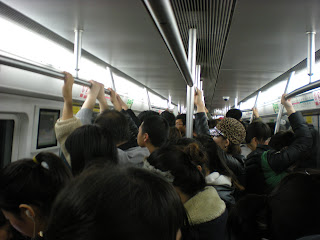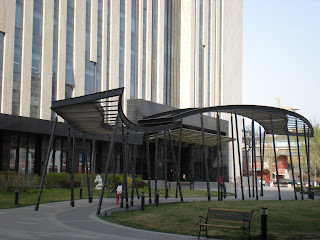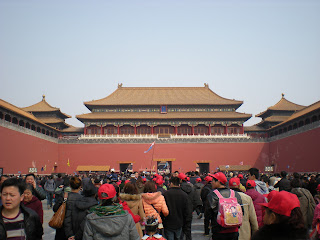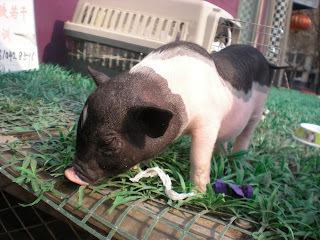I am going to tell you the story of my two possible ends on
the Tibetan plateau.
Because symbols and
dialectics are a poet’s fetish, I might say that one was by fire and one was by
ice.
(They involved, respectively,
cooking and a frozen lake.)
Evidently, I
did not die, and to spare you histrionics, I was not actually close to it.
These were rare times, though, when I
realized that, alone in another country, I had the ability to lead myself to a
na
ïve doom.
(And for your benefit, one of them was
scenic!)
Bird Island
My guidebook tells me that Xining is a common home base for
travelers to Bird Island, a breathtaking (apparently) avian sanctuary on the
west end of Qinghai Lake. Qinghai means
“clear ocean,” and is thus an interesting misnomer for a vast, dry, mountainous
province. Except if you take into
account this huge lake, which is both the province’s identifying feature and
its prominent aberration.
Fate—a messenger of concrete, wind, and gasoline—did not
want me to go to Bird Island. It was a
long tussle between the two of us, but eventually Fate, like a parent the child
must admit knows better, shook its head and nudged me back toward the safety of
my hostel.
The first sign was failing to book a group tour. My guidebook recommended cheap tours run by
the Post Hotel on Fuzhu Road. It gave
the address—138 Fuzhu Road—but not the Chinese name of the hotel. I walked to and along Fuzhu Road, only to discover
that, at a certain point, construction made continuing impossible. Literally, the road deteriorated into piles
of concrete rubble, and the shops that were still standing were deserted. Because most of the shops have no marked
address, I could not locate 138 Fuzhu Road exactly, but am pretty sure it was
beyond the threshold of destruction.
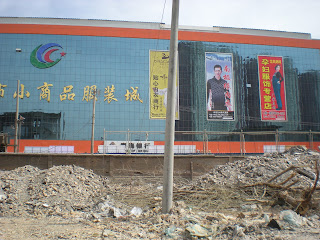 |
| What I am pretty sure is the former address of the Post Hotel. |
I gave up and hailed a taxi to the North Monastery, which
was nearby. The driver let me know that
in March, there is not enough interest in Bird Island, and no such group tours
exist this time of year. May and June
are the popular months. He offered to
drive me himself, though, for 200 yuan.
I parsimoniously declined.
While casually glancing at my map, I noticed the coach bus
schedule. And, lo, every day a bus ran to
Bird Island to “tour the scenery.” I
left my hostel the next day at 6:45 a.m. to make the hour-long walk and just
catch the 7:45 a.m. bus. Again, Fate
told me something was wrong. There was
only one other person in the bus with me, who said, “I guess it’s just the two
of us.” (With the driver, the perfect
number of characters to start a road-trip horror flick.) When pulling out of the parking space, the
driver immediately ran into a barrier.
Fate was angry. As was the
driver’s boss, who came and chewed him out when he surveyed the damage, as I
could see going on in the rear-view mirror.
(The ominous atmosphere is not helped by the fact that we’re
studying the composer Ligeti for the music FSP, and I’m listening to
“Lontano”
as I write this.
Like from
The
Shining.)
Half an hour later we were on our way at last into the
countryside. The mood of the bus became
more cheerful as I learned people on the side of the road can hail the bus, hop
on, and pay the driver the amount a ticket would have been. We stopped at another bus station, where two
men came on board selling tea eggs, corn-on-the-cob, or big scallion
pancakes. One of them obliged my
ridiculous attempt to buy a 3-yuan pancake with a 100-yuan bill, and gave me
the proper change. The sun was lifting,
and with it, my outlook on the day ahead.
 |
| The Open Road |
I had estimated the 200 miles to Bird Island would take
about three hours.
But by that time, we
were not even half-way there.
I began to
wonder what was meant by a bus trip to “tour the scenery,” and whether it would
include a return trip, as I had assumed.
As the other lady who started out on the chatted with the driver, I
heard, “Yeah, I work out there.”
I began
to doubt whether she was going to Bird Island at all, or just somewhere on the
way.
One purpose of this trip, though,
was to see the scenery, and so I did not mind spending long hours looking out
the bus window. Though in the summer, the grasslands are apparently green and splendid, not uniform tan of dormancy I experienced.
 |
| I saw flocks of sheep roaming the grass, which reminded me of New Zealand. The herders and their yaks, less familiar. |
 |
| An early portent. A reservoir lake which was frozen over. Living in New Zealand, I had forgotten it was winter elsewhere. I figured, Qinghai Lake is big...maybe it's not entirely ice! |
There were many small roadside settlements, or those a bit
off from the main road.
I am compelled
by abandoned buildings, and somewhat accustomed to them from rural northern
Minnesota.
But there’s a special aura to
a concrete shell of a building, or a building standing alone among bare,
expansive hills.
Even buildings still in
use that rise up out of a field have a sense of not belonging, of being
temporary.
As if eventually, the must be
abandoned.
 |
| Some villages were surprisingly energy-conscious, with solar panels and windmills. This one reminds me of another, newer-looking one I saw, consisting entirely of identical yellow houses, each with a solar panel and windmill. |
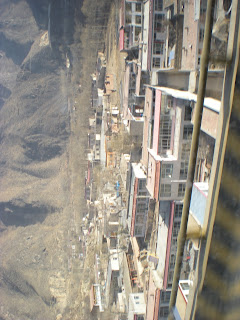 |
| We'll just pretend the bus was going vertically at this point. Sad un-tech-savvy truth: I cannot make this picture (only this one!) not turn on its side when it uploads. |
 |
| An impressive mosque near Duoba that reminded me of The Thief and the Cobbler. |
 |
| In the distance, a village with more traditional architecture. |
 |
| One day, horizontality will overcome. |
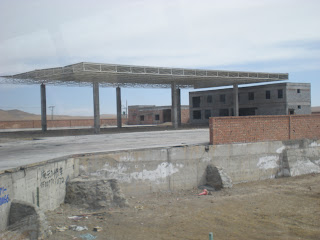 |
| This abandoned fuel station gives me chills. But, oddly, good chills. I wanted to get off the bus and run around in it. I wanted make love in it. I wanted to embody it. |
After almost five hours, we had made it to a comparatively large town called Gangca, complete with its own bus station (meaning a parking lot with adjacent ticket office). According to the regional map I kept checking, this was about 2/3 of the way to Bird Island. It appeared to be the de facto end of the line, seeing as everyone got off but me. Just as I was about to ask the driver if he was going back to Xining that day, he leaned toward me himself and asked, "Do you really want to go to Bird Island?" He told me that the lake is, indeed, still frozen over. I asked him if there were any buses running from there back to the city. He told me not today.
It was at that point that I realized that I actually could end up getting myself killed. Especially had I known no Chinese, and as a result ignored any advice given me. Bird Island, by nature of being a tourist attraction, means a bus line runs there as a final destination. Unlike, assumably, most other bus destinations, which are towns that can offer emergency accomodation. Where you're supposed to buy a return ticket from Bird Island itself, and why the bus line still runs all the way there in March are mysteries to me.
I asked the driver if buses were running to Xining from Gangca, and it turned out yes, in just an hour and a half. I decided to walk around, grab a bite to eat, and then have a pleasant five-hour return journey seeing the scenery on the other side of the road.
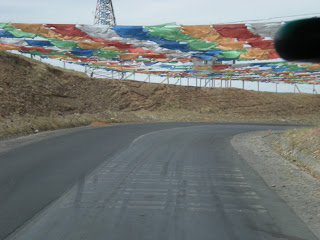 |
| Prayer flags over the highway coming into Gangca. |
 |
| The Tibetan Buddhist mantra ཨོཾ་མ་ཎི་པ་དྨེ་ཧཱུྃ ("om mani padme hum"). This is linguistically interesting because the syllables come from Sanskrit, not Tibetan. To account for retroflex stops and word-final nasals, the scribes made up backwards letters and circles to put above others. As a result, the most common thing you'll see written in Tibetan includes non-original Tibetan letters. |
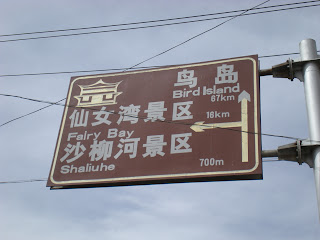 |
| Tantalizingly close... |
 |
| Another ominous sign leading into Gangca. |
Gangca itself was simple, but charming. There were two roads like main streets, lined with restaurants and stores. A market with cheap goods ran between them. There was also a large public square, with no one in it that I saw, and some other unnotable buildings. My most interesting, almost eerie, impression was how the town dissolved into the countryside. Near the edges, the buildings were falling apart or abandoned, as if the emptiness were slowly encroaching. I felt almost like a non-person, five hours from the closest center of civilization, which was still more remote from anything I'd ever known. Gangca felt like an Asian Brigadoon I might enter and be spirited away into, having not been witnessed for days by anyone who could identify me.
 |
| A initial view down the road from the bus. |
 |
| An engaging statue "downtown." |
 |
| A view of bread vendors at the market. |
 |
| The alley that was home to the market. |
 |
| You could tell by the bilingual signage that Tibetans were the prominent ethnic group here. |
 |
| Contrast with this sign (not in Gangca, but back in Xining) which exhibits a special Chinese-character font used to express exotic Tibetanness. |
 |
| You can tell I was trying to be furtive as I took photos, to not look ignorant or rude. The one I think I took behind my back. |
 |
| Inside the Tibetan restaurant I ate at, sharing a table with an older Tibetan couple who were quite friendly. Then for some reason they were moved and I got businessmen instead who didn't talk to me. Anyway, the picture is blurry because I felt like everyone was watching me and took the picture furtively, backward through my armpit. When uploading the photo, I saw that yes, they were indeed looking at me. |
 |
| An empty-feeling alley near the town's periphery. |
 |
| Toward the vanishing point. These all used to be storefronts. Their bold colors make them all the more wistful under the dust. |
But, as you see, from this place of vanishing, which felt like another dimension, or the surface of another planet, I have returned. To do more dumb shit.
Blood Sausage
I should not have eaten the blood sausage.
From the first time I saw it on the menu, I was aware that it was a local dish. I recognized it at a Muslim market, but was too shy and germ-conscious (I know,
me) to buy it there. I tried to order it at the restaurant in Gangca, but they did not have any at the moment. I was on a mission, though, as I get with food conquests. I was going to lose my blood sausage virginity. (Which, incidentally, has to be the most unsettling innuendo I've ever made.)
I found a Tibetan restaurant on the north side of Xining. After shyly being shown my table with room for six or more, I made my bold order: milk tea, meat pastry, and blood sausage.
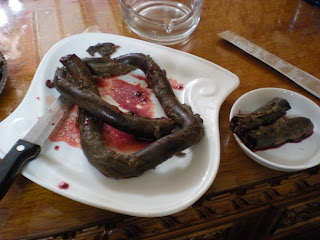 |
| The g(l)ory! |
The waitress brought it to the table, wiped off the knife, and handed it to me. Sagely, she asked if I knew how to prepare it, and of course not. She expertly sliced off the ends, then cut off two chopstickable sections and placed them in a dish for me. I knew the dish was made of blood, of course, but had expected it to be cooked to a uniform consistency, or for the blood to be congealed. No, this was a flamboyantly bloody dish. It dripped out the middle when cut, onto the plate, the knife, the chopsticks. This struck me as hilarious, for how gruesomely realistic it was, how it confronted you with the blatant death involved in its preparation. It was also hilarious how eager I had been to reach this cringe-worthy moment. When I cut into it, some blood squirted onto my pants and I chuckled.
I ate the two pieces the waitress had cut for me. The flavor was distinctly sausage-like. (I had thought "sausage" was perhaps a convenient euphemism, describing the carnivorous and cylindrical quality of the food rather than its consistency.) There was something else, too. Not the metallic twinge of blood in the mouth, but an earthy undertone. Not bad, I thought.
And then it hit me like a 110-degree fever. In an instant, I was filled with a dense nausea, spreading from my stomach to my head. I had to sit sideways on the bench, resting on the decorative pillow. My brain felt swollen. My ears began to hurt. When I opened my eyes, there was the impression of the restaurant, but clouded by a field of white and frenetic specks, like the disorientation of walking into a dark room from bright sunlight. I noticed I was sweating profusely. In seconds it was dripping off me, and I padded it away with the tissues they had given me to wipe the blood off my hands as I ate the sausage. It was like every pore in my body was crazed to eject what I had put into it. I realized that I might end up throwing up over the table, then throwing two hundred-yuan notes at the waitstaff as I ran out of the restaurant in embarrassment.
For a while I wondered if I had eaten something toxic, a possibility for a weak American constitution eating something made of blood in the middle of China. But then I reasoned that few poisons act within seconds. No, the reaction was psychological. While my conscious found the experience novel and even humorous, my subconscious revolted. It was as if I had done something that, by all standards of biology and morality, was anathema.
I realized how deep culture and habit run. I can practice and embrace open-mindedness, but my organs and conscience have been trained differently. As much as Mitchell the person wants to eat everything new, Mitchell the body is vocal about its limits.
After a mortifying eternity, my nausea calmed down mostly, and I could move freely again. (I was not poisoned!) I tried, feebly, to call for the the waitress, explaining that I was sorry, but I could not finish the sausage. She seemed not to hear me. Instead, I pushed the blood sausage to the corner of the table and focused on the meat pastry which seemed to have apparated during the time I could only half-see.
 |
| There. A proper dish. A civilized dish. |
I ate this warm and delicious dish while sipping my warm and delicious milk tea. I tried not to think about the monster in the corner. But the better I felt eating the other food, the more my rebellion kicked back in. I had been confronted with the stark inalterability of my physicality and my heritage. And I wanted to do one better. I wanted to prove my body wrong. I wanted to trust that the mind could triumph.
I weighed the intelligence of the decision. After all, I had only a short while ago suffered the most sudden and severe bodily reaction of my life by eating this blood sausage. But hell, I have only so much time left where "young and reckless" is an excuse.
I ate more than half of what was left of the blood sausage. Bite by bite, concentrating on the flavor rather than the sight of it. When I was finished, I could say I was finished because I was full, not because I was disgusted. (I
was full, too. I had eaten that whole pastry. Look at that thing.)
For dinner, I was not in the mood for mutton sausage noodles, as it was too reminiscent of lunch. I was determined not to lose my lunch later in the day, as that would indicate a failure of sorts. Instead I opted for the purest foods I could think of. Bread and fruit. A meal of aesthetics. A meal of ablution.
 |
| Nothing in these sumptuous swirls could hurt me. |
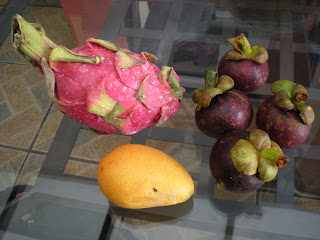 |
| Dragonfruit, mangosteen, and mango. The first two both new flavors for me. |
 |
| The dragonfruit has a surprising white flesh, with the consistency of kiwi. |
 |
| The mangosteen rind is distasteful--inedible in fact. But the creamy white sections, one of which contains the pit, have a luscious, flowery flavor. |
While my palette was cleansed by the fruit, I smelled blood sausage on myself for the rest of the day. How, I wondered, was this possible? Then I noticed it was not a novel smell. It was a long-familiar smell--the spiced, slightly greasy-smoky scent of the city itself. The foreign smell that had contributed to my initial stomach-sick homesickness. Now I had truly--viscerally--internalized it, and conquered. And I was exuding it myself.





